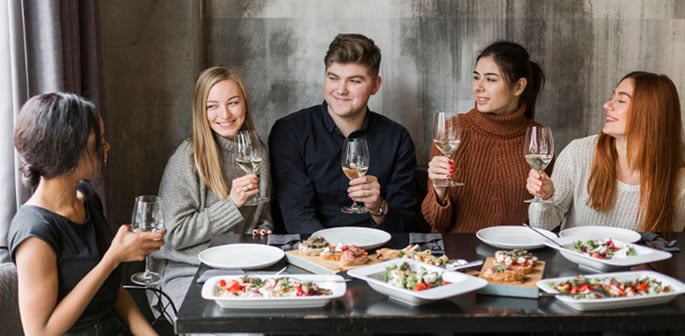“This isn’t about being virtuous."
Gen Z diners are fuelling a surge in early evening restaurant bookings as London spots pivot to cater for purposeful post-work meals.
Joe Laker, co-founder and head chef at Counter 71, said:
“It’s a more accessible experience that still reflects our standards.
“It’s a more relaxed way to unwind.”
Across the UK, restaurants are adapting to meet the demand for earlier dining. Fashionably late is out. In 2025, early diners are first to the fork.
Data from OpenTable shows 6 pm reservations are up 11% in London and 6% across the UK compared with 2024.
Zonal, the hospitality tech service, says the new national average dining time is 6:12 pm. Nearly half of all bookings now fall between midday and 6 pm.
Laker’s £50 menu at Counter 71 features snacks from its long-form dinner, a whole chicken main, and “playful” desserts. The menu reflects a wider shift.
He added: “Many of our guests now live further out than before.
“They want to eat early so they’re not sprinting for the last train.”
The change began after the Covid-19 pandemic and is now reshaping UK dining habits.
Younger professionals are swapping late-night indulgence for earlier, calmer meals. Commuters, wellness-minded workers, and sober-curious Gen Z customers are driving the trend.
Lucia Reisch, a professor of behavioural economics at the University of Cambridge, said Covid accelerated the change:
“People who work from home tend to start and finish earlier, which naturally leads to earlier dining. Add the lack of a commute, and people have far more flexibility.
“There’s also now broader public awareness that late-night eating isn’t great for health.”
Wellness and cost-saving matter to younger diners.
Dr Richard Piper, chief executive of Alcohol Change UK, said:
“Our research into drinking habits tells us that younger people especially are making choices that put their physical and mental wellbeing, but also financial health, first.
“Earlier dining may be down to similar drivers, like saving money and still socialising but without a late night, or a hangover, in pursuit of better sleep and wellbeing.”
Laura Willoughby, the co-founder of low and no-alcohol group Club Soda, said the trend is about balance:
“This isn’t about being virtuous. It’s about making the most of the week, whether that’s getting to the gym early or having a quiet dinner midweek and saving bigger nights out for the weekend.”
For Aamena Hanif, a London professional, the appeal is personal:
“I’ve started booking dinner around 6 pm because the vibe just suits me better.
“I don’t drink, so I’m not looking for a buzzy atmosphere. Early evenings are calmer. You can actually hear your friends talk.”
Restaurants are adjusting. Sael, a private dining room in St James’s Market, London, has seen its early prix fixe menu thrive.
Chef and restaurateur Jason Atherton said:
“People are commuting farther and want to get home earlier, and health is a big factor.
“Before the pandemic, we’d be plating main courses at midnight. Now, most of our venues close well before that.”
Beyond London, the trend is spreading. Fifty Two at the Rudding Park Hotel in Harrogate now serves Sunday dinner from 6 pm sharp.
Linda Haden of Lumina Intelligence said:
“Eating out is becoming a way to socialise without compromising other goals.
“We’re seeing more smoothies and fewer cocktails on dinner tables.”
Restaurant analyst Peter Backman sees a cultural shift:
“Dining at 6 pm signals the end of the workday. It’s not just about food; it’s about reclaiming time.”
Andrew Oswald, an economics and behavioural science professor at the University of Warwick, agreed:
“Londoners had the longest commutes in the UK. The pandemic broke the psychological mould.
“People had time to realise they didn’t want to arrive home at 9 pm anymore. I doubt they’ll go back.”






























































